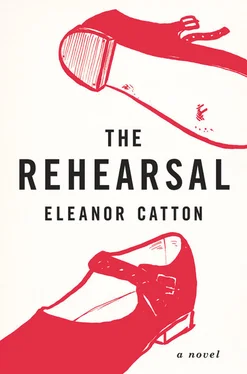This wasn’t really true, but he was pleased with the way it sounded.
October
The Head of Movement’s office door was open, and Stanley didn’t knock. He padded up to the doorframe and lingered there for a moment before he began to speak.
“I should have failed,” he said. “That’s all I wanted to say. I should have failed the Outing. I told someone outright that I was doing an acting exercise. I even told her I was doing Joe Pitt.”
The Head of Movement looked up at him, the light from his desk-lamp drawing down the shadows around his eyes and his mouth. “Why?” he said, making no move to gesture Stanley inside, and so Stanley remained at the doorway with his hands tugging at the straps of his backpack, moving his weight from foot to foot.
“Because otherwise she might have thought that Joe Pitt was really me,” Stanley said. “I didn’t want her to think that.”
The Head of Movement sighed and rubbed his face with his hands.
“Stanley,” he said, “why are you telling me this? You don’t want a failing grade on your card. It’ll be a mark against you. If this was weighing on your conscience, why didn’t you just resolve to do better next time? Why would you choose to sabotage yourself?”
“To make you respect me,” Stanley said.
“To make me respect you,” the Head of Movement said.
Stanley was breathing quickly. “To make you see me,” he said. “To make you see me when you look.”
The Head of Movement looked at the boy and wondered if he should relent. Stanley’s throat was tight and he quavered when he spoke, but underneath his nervousness there was that persistent thread of self-congratulation, even now. The Head of Movement felt a flicker of anger. Even now, he thought. Even now the boy is performing, and adoring his performance, adoring himself.
“Every year there’s someone like you, Stanley,” he said. “And someone just like you will come along and fill the hole that you leave when you move on. Every word that comes out of your mouth—they’re just lines . They’re lines that you’ve learned very carefully, so carefully you’ve convinced yourself they are yours, but that’s all they are. They’re lines I’ve heard many times before.” The Head of Movement tossed his head suddenly, and snapped, “Why don’t you see me when you look? I could ask that of all my students. All my selfish cookie-cutter students who troop in and out each year like a dead-water tide.”
“What about that boy you were with in the art department? Is he a cookie-cutter student too?” Stanley asked sourly.
There was a pause. The Head of Movement raised his eyebrows.
“The boy I was with in the art department?” he said.
“The masked boy from the Theater of Cruelty,” Stanley mumbled. “Nick.”
“What do you want to know about Nick?”
“Is he a cookie-cutter student too?” Stanley was thoroughly embarrassed now.
The tutor looked him up and down and almost laughed. “Maybe so,” he said. “But he’s like me. He’s like I once was. I listen to him speak, and watch him move, and it is like a kind of rebirth. I can relive myself, through him. I can be new again just by watching.”
Stanley looked at the floor and didn’t speak.
“Thank you for coming to me today,” the Head of Movement said, after a moment. His voice was cold and his face had closed. “We will amend your records to show a failing grade.”
Friday
“Are you good friends with your sister, Isolde?” the saxophone teacher asks mildly one afternoon, after Isolde’s lesson is over and the girl is repacking her case.
“Not really,” Isolde says.
“Do you hang out with her much at school?”
“No. It’s weird when the juniors hang out with the seniors. And she’s got friends in her own year. They don’t like me around.”
“Would she be someone you’d talk to, if you needed someone?”
Isolde flushes scarlet immediately. She turns away from the saxophone teacher and ducks to fiddle with the clasp on her satchel. “Probably not,” she says.
“Okay,” the saxophone teacher says kindly, watching her.
“I don’t know who I’d talk to,” Isolde mumbles.
“Not your friends?”
“No.”
The saxophone teacher waits while Isolde shuffles her music and stuffs it into her backpack.
“Actually it’s kind of weird that Victoria’s so popular,” Isolde says, regaining composure, “because she was ruined. Three years ago, in fourth form. Her friends decided they didn’t really like her and they had a conference about it to decide what to do with her. In the end they just gathered around one lunchtime and told her that she wasn’t allowed to sit with them or talk to them anymore. And then they all ran away.”
“I suppose she moved on and found some new friends,” the saxophone teacher says.
“You can’t, really,” says Isolde. “Once you’ve been dumped by one group. The other groups get suspicious. There’s nothing to do except hang out in the library and always come to class at the last possible moment so it’s not like you’re sitting alone and waiting.
“Most of the girls keep best friends for security,” she adds. “You’ve always got an ally that way, and you’re less likely to be dumped.”
“So how did your sister climb her way back up?” the saxophone teacher asks. “If she really was ruined, as you say.”
“She fell in with some boys,” Isolde says. “She started crossing the road at lunchtime and hanging out with the St. Sylvester boys down by the river. Just her and the boys. That was like her weapon. The girls started coming back to her after that.”
“Have you ever been dumped?” the saxophone teacher says. “By a group, I mean.”
“Nah,” Isolde says. She is wrapped up in her scarf and her coat now, and she shrugs in a general, helpless way to show the conversation has come to a close.
“See you next week,” she says, and just for a moment the saxophone teacher feels a stab of something like sadness, wanting very much to ask Isolde to stay. These weekly half-hour snatches of Isolde’s life are to the sax teacher only the lighted squares of kitchen windows along a dark street, showing a brief and yellowed glimpse into the throat of a house but nothing more.
Isolde has glazed over with politeness now that the lesson has ended, standing near the door with her music case already in her hand. The precious quickened intimacy of the lesson is now lost, and the saxophone teacher can only smile and wave her out and say, “See you Monday, Isolde. Take care.”
Friday
Patsy has brought croissants and ham, and a soft yellow cheese which depresses under the blunt edge of the butter knife. Already they have talked for nearly an hour and the saxophone teacher has watched Patsy with a kind of bursting desperate look, straining and wounded like a stuck deer. She looks as if she might burst into tears. Patsy doesn’t seem to be noticing.
“Patsy,” the saxophone teacher says finally. “Do you know something? Whenever I am alone and intimate with anybody else, whenever I am at ease, or making someone laugh, or kissing somebody, or making someone feel truly good—whenever I feel like I am being really successful as a lover, doing it right —at all those times, part of me is wishing that you were watching me.”
“That’s a weird thing to say,” Patsy says, giving the sax teacher a quizzical half-frown. She is already withdrawing, sitting back and bringing the heel of her hand to her cheek to push away a strand of hair and becoming swiftly impenetrable, as if she is determined to misunderstand whatever the sax teacher will say next. All in an instant she is stony and aloof.
Читать дальше












